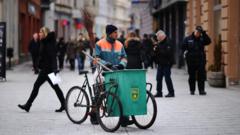In July 1995, Srebrenica witnessed one of Europe’s most horrific war crimes, as Bosnian Serb forces executed over 8,000 Bosnian Muslim men and boys. Today, three decades later, the aftermath lingers, manifesting in current societal tensions and divisions. The world premiere of the play "Flowers of Srebrenica" at Sarajevo's War Theatre powerfully encapsulates this ongoing struggle for acknowledgment and healing.
The massacre's grim reality continues to haunt victims' families, many of whom remain in relentless pursuit of their loved ones' remains. Despite help from DNA testing, countless remain lost, their identities tied only to clothing or personal objects used in the play, accentuating the personal nature of the tragedy.
While the audience in Sarajevo embraces the performance, in the majority-Serb Republika Srpska, leaders brazenly deny the genocide, contradicting international tribunal findings against former military leader Ratko Mladić and political leader Radovan Karadžić. Actor Selma Alispahić, a former refugee, expresses frustration over persistent denial and the manipulation of historical truths by political figures for personal gain.
The Dayton Peace Agreement formally established different ethnic entities but also left deep fissures, exemplified by the rising tensions from Republika Srpska's president Milorad Dodik, who is undermining national institutions and inciting further divides. High Representative Christian Schmidt warns of the dangers posed by such actions, calling for international intervention to maintain peace.
In Sarajevo, the recent commemoration efforts demonstrate a strong commitment to honor the victims, contrasting sharply with the lack of recognition in East Sarajevo, where residents experience growing distress. Those remembering at Potočari Cemetery, including families of victims, worry about the return of hostilities reminiscent of the early 1990s.
Despite political maneuvering that manipulates ethnic grievances, many individuals strive for solidarity, evidenced by an outpouring of support during recent commemorative events. As dialogue regarding accountability continues, the challenge for Bosnia and Herzegovina remains finding a path toward reconciliation amidst the heaviness of its past.
















